Examining Legal Frameworks in Travel and Tourism: Thomas Cook Case
VerifiedAdded on 2023/04/04
|15
|4545
|373
Report
AI Summary
This report provides a detailed overview of the legislation affecting the travel and tourism sector, focusing on health, safety, equality, contract law, and consumer protection. It examines the principles of health and safety legislation, emphasizing the importance of providing safe and secure services to customers, as mandated by the Health and Safety at Work Act 1974. The report also discusses equality legislation, highlighting the need to treat all individuals equally, irrespective of race, religion, or background, as outlined in the Equality Act 2010. Contract legislation is explored in relation to travel and tourism, emphasizing the legal relationship between travel agents and customers, with a focus on the elements of a valid contract, including offer, acceptance, and consideration. Additionally, the report addresses consumer protection legislation, ethical issues, and customer social responsibility within the travel and tourism industry, using Thomas Cook as a case study. The document is available on Desklib, a platform offering AI-based study tools and solved assignments for students.
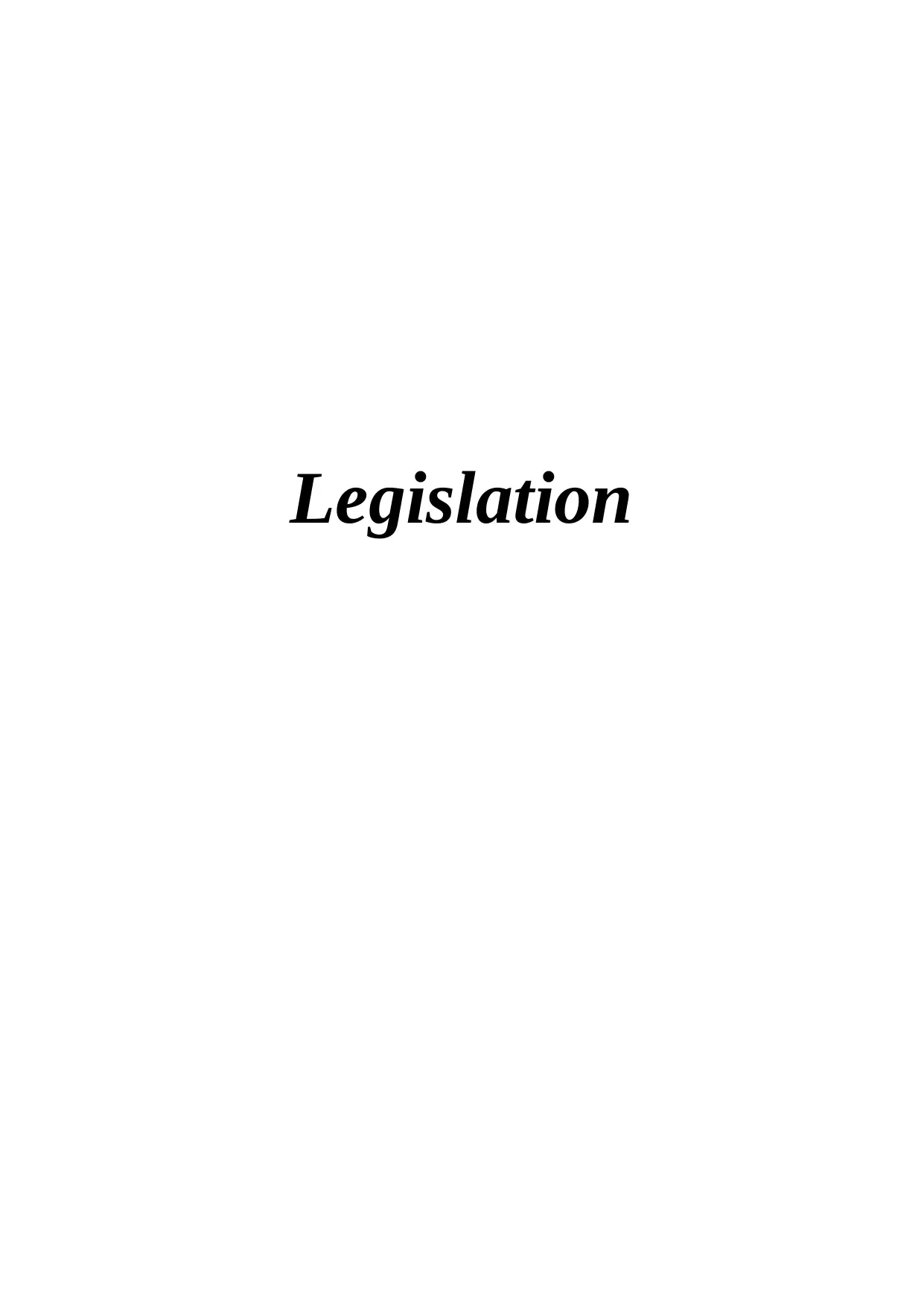
Legislation
Paraphrase This Document
Need a fresh take? Get an instant paraphrase of this document with our AI Paraphraser
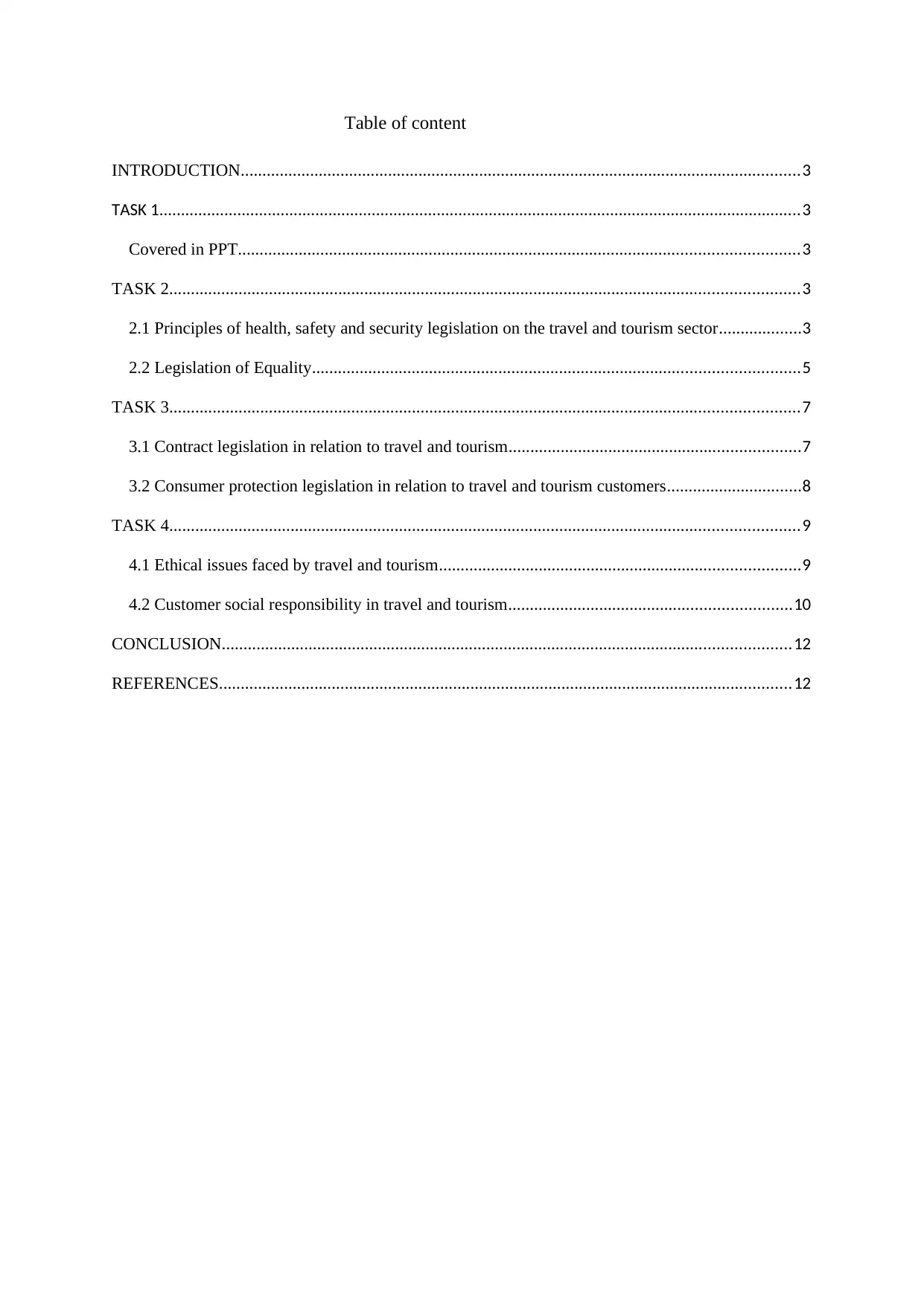
Table of content
INTRODUCTION.................................................................................................................................3
TASK 1....................................................................................................................................................3
Covered in PPT.................................................................................................................................3
TASK 2.................................................................................................................................................3
2.1 Principles of health, safety and security legislation on the travel and tourism sector...................3
2.2 Legislation of Equality................................................................................................................5
TASK 3.................................................................................................................................................7
3.1 Contract legislation in relation to travel and tourism...................................................................7
3.2 Consumer protection legislation in relation to travel and tourism customers...............................8
TASK 4.................................................................................................................................................9
4.1 Ethical issues faced by travel and tourism...................................................................................9
4.2 Customer social responsibility in travel and tourism.................................................................10
CONCLUSION...................................................................................................................................12
REFERENCES....................................................................................................................................12
INTRODUCTION.................................................................................................................................3
TASK 1....................................................................................................................................................3
Covered in PPT.................................................................................................................................3
TASK 2.................................................................................................................................................3
2.1 Principles of health, safety and security legislation on the travel and tourism sector...................3
2.2 Legislation of Equality................................................................................................................5
TASK 3.................................................................................................................................................7
3.1 Contract legislation in relation to travel and tourism...................................................................7
3.2 Consumer protection legislation in relation to travel and tourism customers...............................8
TASK 4.................................................................................................................................................9
4.1 Ethical issues faced by travel and tourism...................................................................................9
4.2 Customer social responsibility in travel and tourism.................................................................10
CONCLUSION...................................................................................................................................12
REFERENCES....................................................................................................................................12
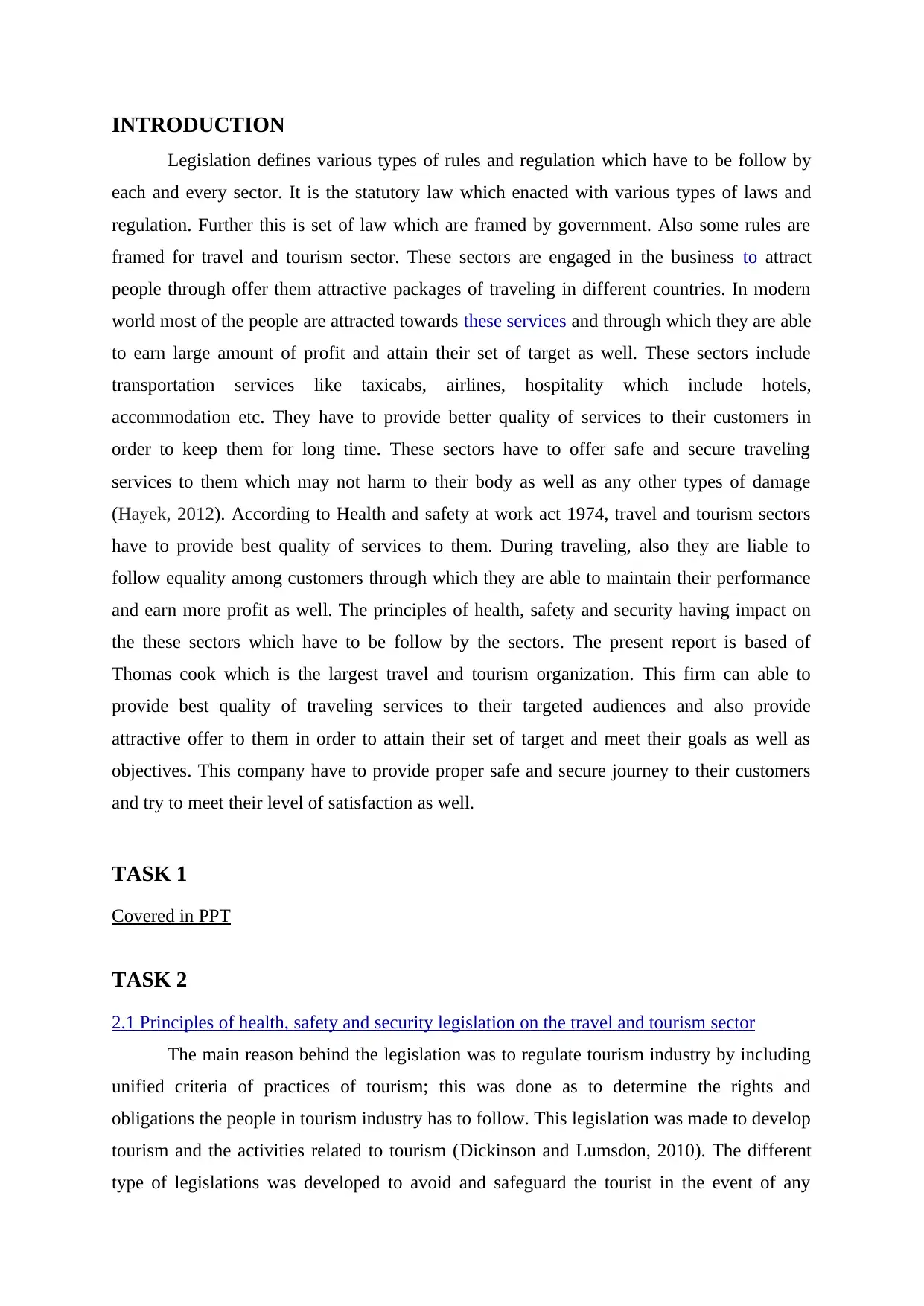
INTRODUCTION
Legislation defines various types of rules and regulation which have to be follow by
each and every sector. It is the statutory law which enacted with various types of laws and
regulation. Further this is set of law which are framed by government. Also some rules are
framed for travel and tourism sector. These sectors are engaged in the business to attract
people through offer them attractive packages of traveling in different countries. In modern
world most of the people are attracted towards these services and through which they are able
to earn large amount of profit and attain their set of target as well. These sectors include
transportation services like taxicabs, airlines, hospitality which include hotels,
accommodation etc. They have to provide better quality of services to their customers in
order to keep them for long time. These sectors have to offer safe and secure traveling
services to them which may not harm to their body as well as any other types of damage
(Hayek, 2012). According to Health and safety at work act 1974, travel and tourism sectors
have to provide best quality of services to them. During traveling, also they are liable to
follow equality among customers through which they are able to maintain their performance
and earn more profit as well. The principles of health, safety and security having impact on
the these sectors which have to be follow by the sectors. The present report is based of
Thomas cook which is the largest travel and tourism organization. This firm can able to
provide best quality of traveling services to their targeted audiences and also provide
attractive offer to them in order to attain their set of target and meet their goals as well as
objectives. This company have to provide proper safe and secure journey to their customers
and try to meet their level of satisfaction as well.
TASK 1
Covered in PPT
TASK 2
2.1 Principles of health, safety and security legislation on the travel and tourism sector
The main reason behind the legislation was to regulate tourism industry by including
unified criteria of practices of tourism; this was done as to determine the rights and
obligations the people in tourism industry has to follow. This legislation was made to develop
tourism and the activities related to tourism (Dickinson and Lumsdon, 2010). The different
type of legislations was developed to avoid and safeguard the tourist in the event of any
Legislation defines various types of rules and regulation which have to be follow by
each and every sector. It is the statutory law which enacted with various types of laws and
regulation. Further this is set of law which are framed by government. Also some rules are
framed for travel and tourism sector. These sectors are engaged in the business to attract
people through offer them attractive packages of traveling in different countries. In modern
world most of the people are attracted towards these services and through which they are able
to earn large amount of profit and attain their set of target as well. These sectors include
transportation services like taxicabs, airlines, hospitality which include hotels,
accommodation etc. They have to provide better quality of services to their customers in
order to keep them for long time. These sectors have to offer safe and secure traveling
services to them which may not harm to their body as well as any other types of damage
(Hayek, 2012). According to Health and safety at work act 1974, travel and tourism sectors
have to provide best quality of services to them. During traveling, also they are liable to
follow equality among customers through which they are able to maintain their performance
and earn more profit as well. The principles of health, safety and security having impact on
the these sectors which have to be follow by the sectors. The present report is based of
Thomas cook which is the largest travel and tourism organization. This firm can able to
provide best quality of traveling services to their targeted audiences and also provide
attractive offer to them in order to attain their set of target and meet their goals as well as
objectives. This company have to provide proper safe and secure journey to their customers
and try to meet their level of satisfaction as well.
TASK 1
Covered in PPT
TASK 2
2.1 Principles of health, safety and security legislation on the travel and tourism sector
The main reason behind the legislation was to regulate tourism industry by including
unified criteria of practices of tourism; this was done as to determine the rights and
obligations the people in tourism industry has to follow. This legislation was made to develop
tourism and the activities related to tourism (Dickinson and Lumsdon, 2010). The different
type of legislations was developed to avoid and safeguard the tourist in the event of any
⊘ This is a preview!⊘
Do you want full access?
Subscribe today to unlock all pages.

Trusted by 1+ million students worldwide
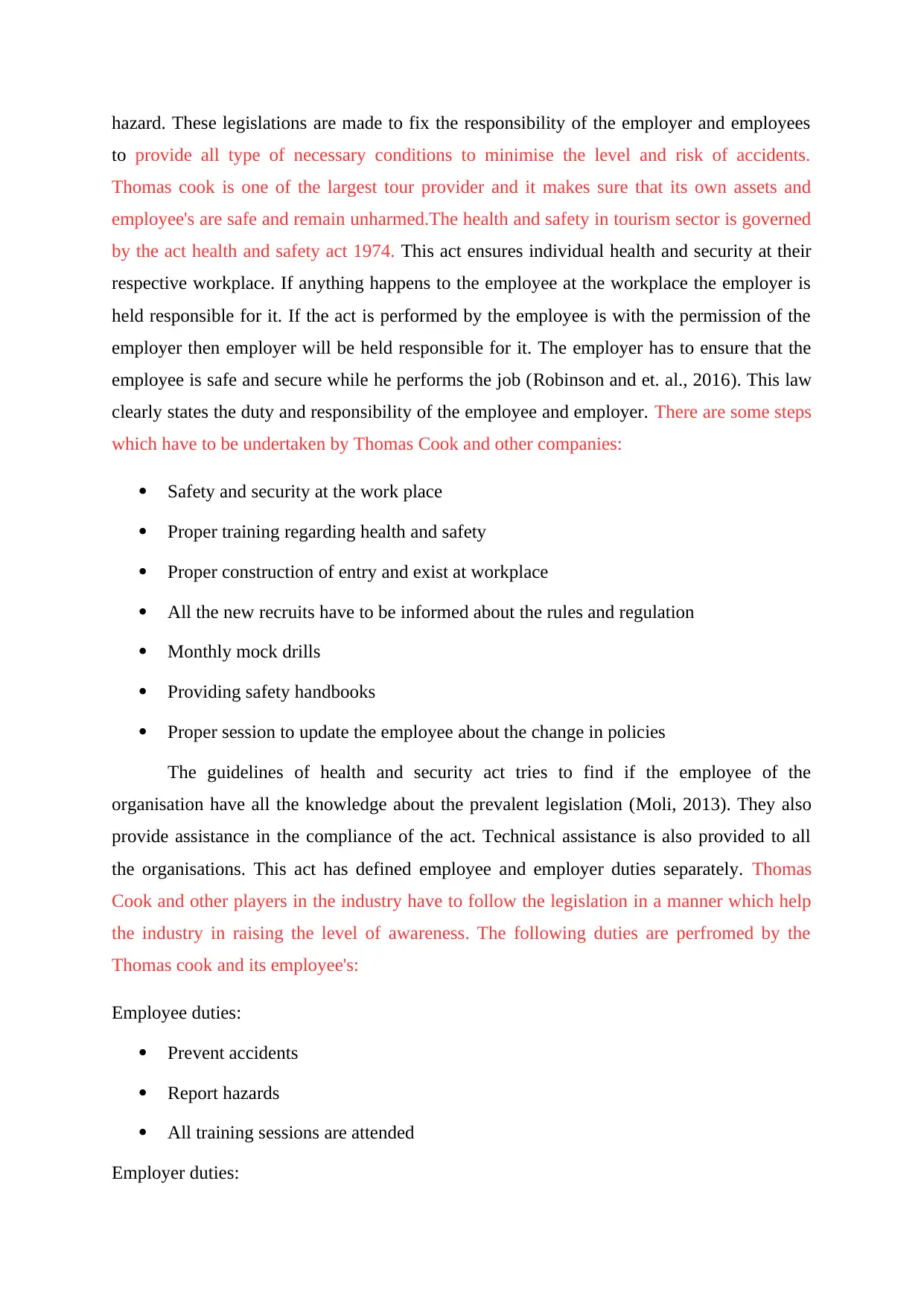
hazard. These legislations are made to fix the responsibility of the employer and employees
to provide all type of necessary conditions to minimise the level and risk of accidents.
Thomas cook is one of the largest tour provider and it makes sure that its own assets and
employee's are safe and remain unharmed.The health and safety in tourism sector is governed
by the act health and safety act 1974. This act ensures individual health and security at their
respective workplace. If anything happens to the employee at the workplace the employer is
held responsible for it. If the act is performed by the employee is with the permission of the
employer then employer will be held responsible for it. The employer has to ensure that the
employee is safe and secure while he performs the job (Robinson and et. al., 2016). This law
clearly states the duty and responsibility of the employee and employer. There are some steps
which have to be undertaken by Thomas Cook and other companies:
Safety and security at the work place
Proper training regarding health and safety
Proper construction of entry and exist at workplace
All the new recruits have to be informed about the rules and regulation
Monthly mock drills
Providing safety handbooks
Proper session to update the employee about the change in policies
The guidelines of health and security act tries to find if the employee of the
organisation have all the knowledge about the prevalent legislation (Moli, 2013). They also
provide assistance in the compliance of the act. Technical assistance is also provided to all
the organisations. This act has defined employee and employer duties separately. Thomas
Cook and other players in the industry have to follow the legislation in a manner which help
the industry in raising the level of awareness. The following duties are perfromed by the
Thomas cook and its employee's:
Employee duties:
Prevent accidents
Report hazards
All training sessions are attended
Employer duties:
to provide all type of necessary conditions to minimise the level and risk of accidents.
Thomas cook is one of the largest tour provider and it makes sure that its own assets and
employee's are safe and remain unharmed.The health and safety in tourism sector is governed
by the act health and safety act 1974. This act ensures individual health and security at their
respective workplace. If anything happens to the employee at the workplace the employer is
held responsible for it. If the act is performed by the employee is with the permission of the
employer then employer will be held responsible for it. The employer has to ensure that the
employee is safe and secure while he performs the job (Robinson and et. al., 2016). This law
clearly states the duty and responsibility of the employee and employer. There are some steps
which have to be undertaken by Thomas Cook and other companies:
Safety and security at the work place
Proper training regarding health and safety
Proper construction of entry and exist at workplace
All the new recruits have to be informed about the rules and regulation
Monthly mock drills
Providing safety handbooks
Proper session to update the employee about the change in policies
The guidelines of health and security act tries to find if the employee of the
organisation have all the knowledge about the prevalent legislation (Moli, 2013). They also
provide assistance in the compliance of the act. Technical assistance is also provided to all
the organisations. This act has defined employee and employer duties separately. Thomas
Cook and other players in the industry have to follow the legislation in a manner which help
the industry in raising the level of awareness. The following duties are perfromed by the
Thomas cook and its employee's:
Employee duties:
Prevent accidents
Report hazards
All training sessions are attended
Employer duties:
Paraphrase This Document
Need a fresh take? Get an instant paraphrase of this document with our AI Paraphraser
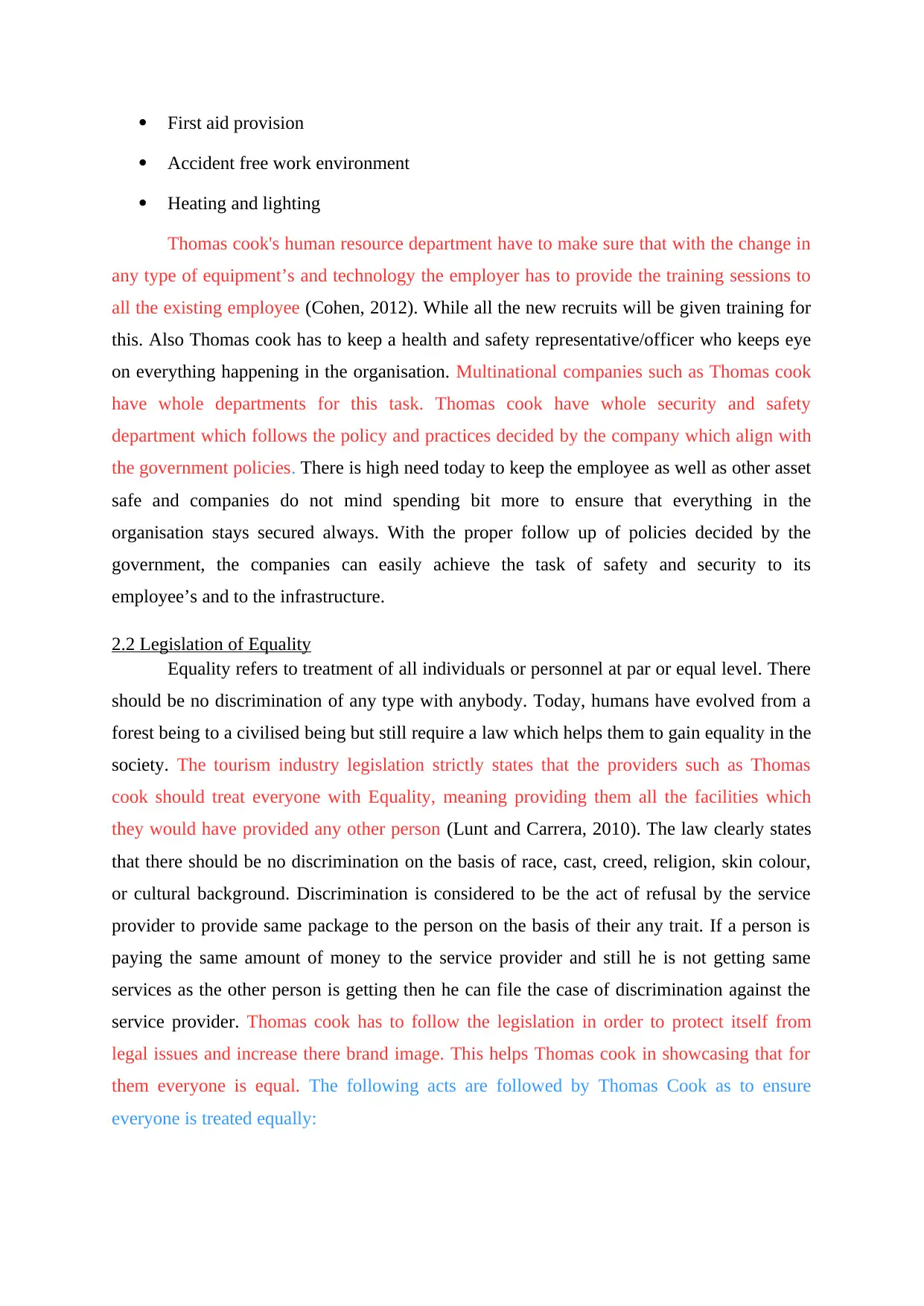
First aid provision
Accident free work environment
Heating and lighting
Thomas cook's human resource department have to make sure that with the change in
any type of equipment’s and technology the employer has to provide the training sessions to
all the existing employee (Cohen, 2012). While all the new recruits will be given training for
this. Also Thomas cook has to keep a health and safety representative/officer who keeps eye
on everything happening in the organisation. Multinational companies such as Thomas cook
have whole departments for this task. Thomas cook have whole security and safety
department which follows the policy and practices decided by the company which align with
the government policies. There is high need today to keep the employee as well as other asset
safe and companies do not mind spending bit more to ensure that everything in the
organisation stays secured always. With the proper follow up of policies decided by the
government, the companies can easily achieve the task of safety and security to its
employee’s and to the infrastructure.
2.2 Legislation of Equality
Equality refers to treatment of all individuals or personnel at par or equal level. There
should be no discrimination of any type with anybody. Today, humans have evolved from a
forest being to a civilised being but still require a law which helps them to gain equality in the
society. The tourism industry legislation strictly states that the providers such as Thomas
cook should treat everyone with Equality, meaning providing them all the facilities which
they would have provided any other person (Lunt and Carrera, 2010). The law clearly states
that there should be no discrimination on the basis of race, cast, creed, religion, skin colour,
or cultural background. Discrimination is considered to be the act of refusal by the service
provider to provide same package to the person on the basis of their any trait. If a person is
paying the same amount of money to the service provider and still he is not getting same
services as the other person is getting then he can file the case of discrimination against the
service provider. Thomas cook has to follow the legislation in order to protect itself from
legal issues and increase there brand image. This helps Thomas cook in showcasing that for
them everyone is equal. The following acts are followed by Thomas Cook as to ensure
everyone is treated equally:
Accident free work environment
Heating and lighting
Thomas cook's human resource department have to make sure that with the change in
any type of equipment’s and technology the employer has to provide the training sessions to
all the existing employee (Cohen, 2012). While all the new recruits will be given training for
this. Also Thomas cook has to keep a health and safety representative/officer who keeps eye
on everything happening in the organisation. Multinational companies such as Thomas cook
have whole departments for this task. Thomas cook have whole security and safety
department which follows the policy and practices decided by the company which align with
the government policies. There is high need today to keep the employee as well as other asset
safe and companies do not mind spending bit more to ensure that everything in the
organisation stays secured always. With the proper follow up of policies decided by the
government, the companies can easily achieve the task of safety and security to its
employee’s and to the infrastructure.
2.2 Legislation of Equality
Equality refers to treatment of all individuals or personnel at par or equal level. There
should be no discrimination of any type with anybody. Today, humans have evolved from a
forest being to a civilised being but still require a law which helps them to gain equality in the
society. The tourism industry legislation strictly states that the providers such as Thomas
cook should treat everyone with Equality, meaning providing them all the facilities which
they would have provided any other person (Lunt and Carrera, 2010). The law clearly states
that there should be no discrimination on the basis of race, cast, creed, religion, skin colour,
or cultural background. Discrimination is considered to be the act of refusal by the service
provider to provide same package to the person on the basis of their any trait. If a person is
paying the same amount of money to the service provider and still he is not getting same
services as the other person is getting then he can file the case of discrimination against the
service provider. Thomas cook has to follow the legislation in order to protect itself from
legal issues and increase there brand image. This helps Thomas cook in showcasing that for
them everyone is equal. The following acts are followed by Thomas Cook as to ensure
everyone is treated equally:
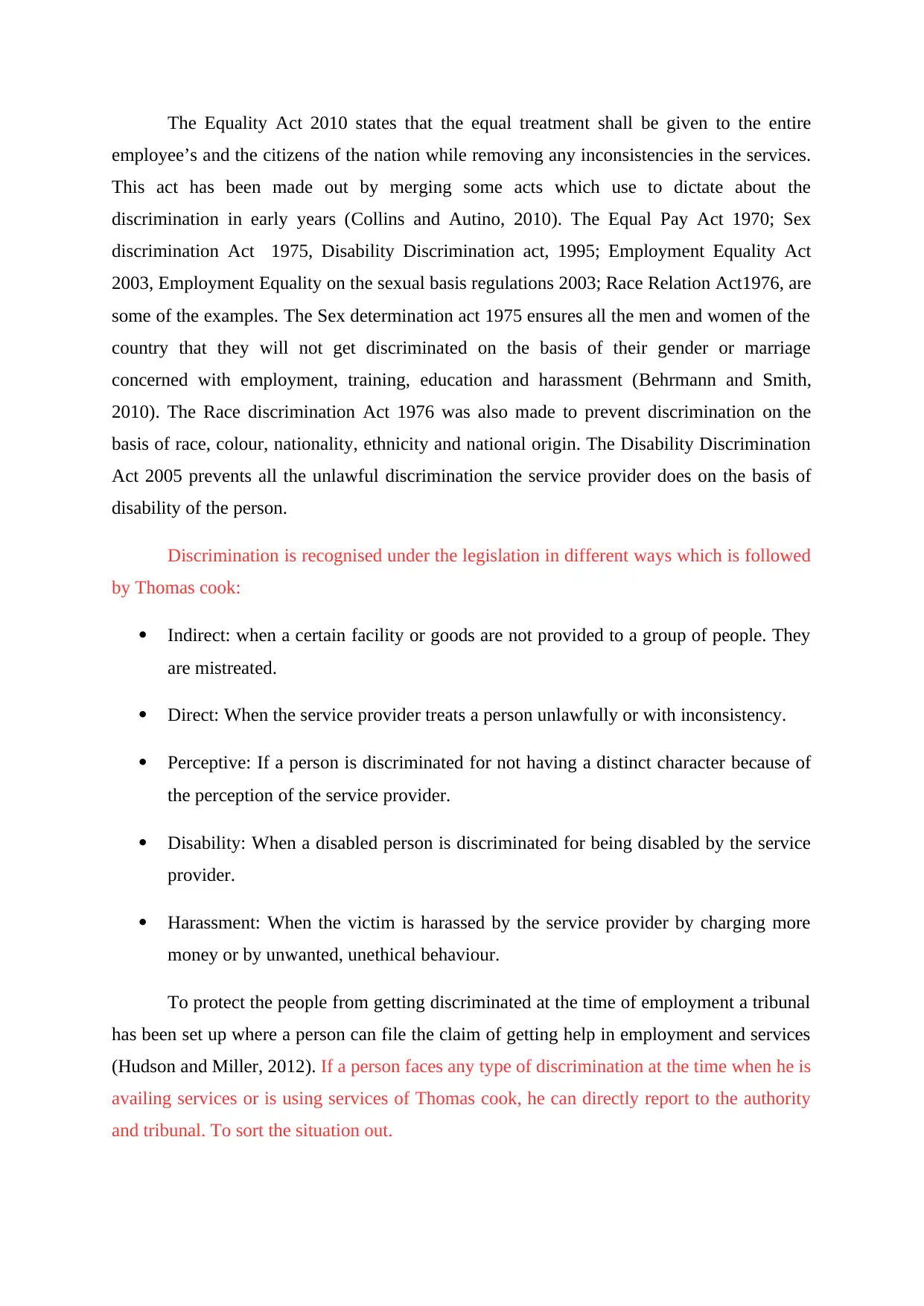
The Equality Act 2010 states that the equal treatment shall be given to the entire
employee’s and the citizens of the nation while removing any inconsistencies in the services.
This act has been made out by merging some acts which use to dictate about the
discrimination in early years (Collins and Autino, 2010). The Equal Pay Act 1970; Sex
discrimination Act 1975, Disability Discrimination act, 1995; Employment Equality Act
2003, Employment Equality on the sexual basis regulations 2003; Race Relation Act1976, are
some of the examples. The Sex determination act 1975 ensures all the men and women of the
country that they will not get discriminated on the basis of their gender or marriage
concerned with employment, training, education and harassment (Behrmann and Smith,
2010). The Race discrimination Act 1976 was also made to prevent discrimination on the
basis of race, colour, nationality, ethnicity and national origin. The Disability Discrimination
Act 2005 prevents all the unlawful discrimination the service provider does on the basis of
disability of the person.
Discrimination is recognised under the legislation in different ways which is followed
by Thomas cook:
Indirect: when a certain facility or goods are not provided to a group of people. They
are mistreated.
Direct: When the service provider treats a person unlawfully or with inconsistency.
Perceptive: If a person is discriminated for not having a distinct character because of
the perception of the service provider.
Disability: When a disabled person is discriminated for being disabled by the service
provider.
Harassment: When the victim is harassed by the service provider by charging more
money or by unwanted, unethical behaviour.
To protect the people from getting discriminated at the time of employment a tribunal
has been set up where a person can file the claim of getting help in employment and services
(Hudson and Miller, 2012). If a person faces any type of discrimination at the time when he is
availing services or is using services of Thomas cook, he can directly report to the authority
and tribunal. To sort the situation out.
employee’s and the citizens of the nation while removing any inconsistencies in the services.
This act has been made out by merging some acts which use to dictate about the
discrimination in early years (Collins and Autino, 2010). The Equal Pay Act 1970; Sex
discrimination Act 1975, Disability Discrimination act, 1995; Employment Equality Act
2003, Employment Equality on the sexual basis regulations 2003; Race Relation Act1976, are
some of the examples. The Sex determination act 1975 ensures all the men and women of the
country that they will not get discriminated on the basis of their gender or marriage
concerned with employment, training, education and harassment (Behrmann and Smith,
2010). The Race discrimination Act 1976 was also made to prevent discrimination on the
basis of race, colour, nationality, ethnicity and national origin. The Disability Discrimination
Act 2005 prevents all the unlawful discrimination the service provider does on the basis of
disability of the person.
Discrimination is recognised under the legislation in different ways which is followed
by Thomas cook:
Indirect: when a certain facility or goods are not provided to a group of people. They
are mistreated.
Direct: When the service provider treats a person unlawfully or with inconsistency.
Perceptive: If a person is discriminated for not having a distinct character because of
the perception of the service provider.
Disability: When a disabled person is discriminated for being disabled by the service
provider.
Harassment: When the victim is harassed by the service provider by charging more
money or by unwanted, unethical behaviour.
To protect the people from getting discriminated at the time of employment a tribunal
has been set up where a person can file the claim of getting help in employment and services
(Hudson and Miller, 2012). If a person faces any type of discrimination at the time when he is
availing services or is using services of Thomas cook, he can directly report to the authority
and tribunal. To sort the situation out.
⊘ This is a preview!⊘
Do you want full access?
Subscribe today to unlock all pages.

Trusted by 1+ million students worldwide
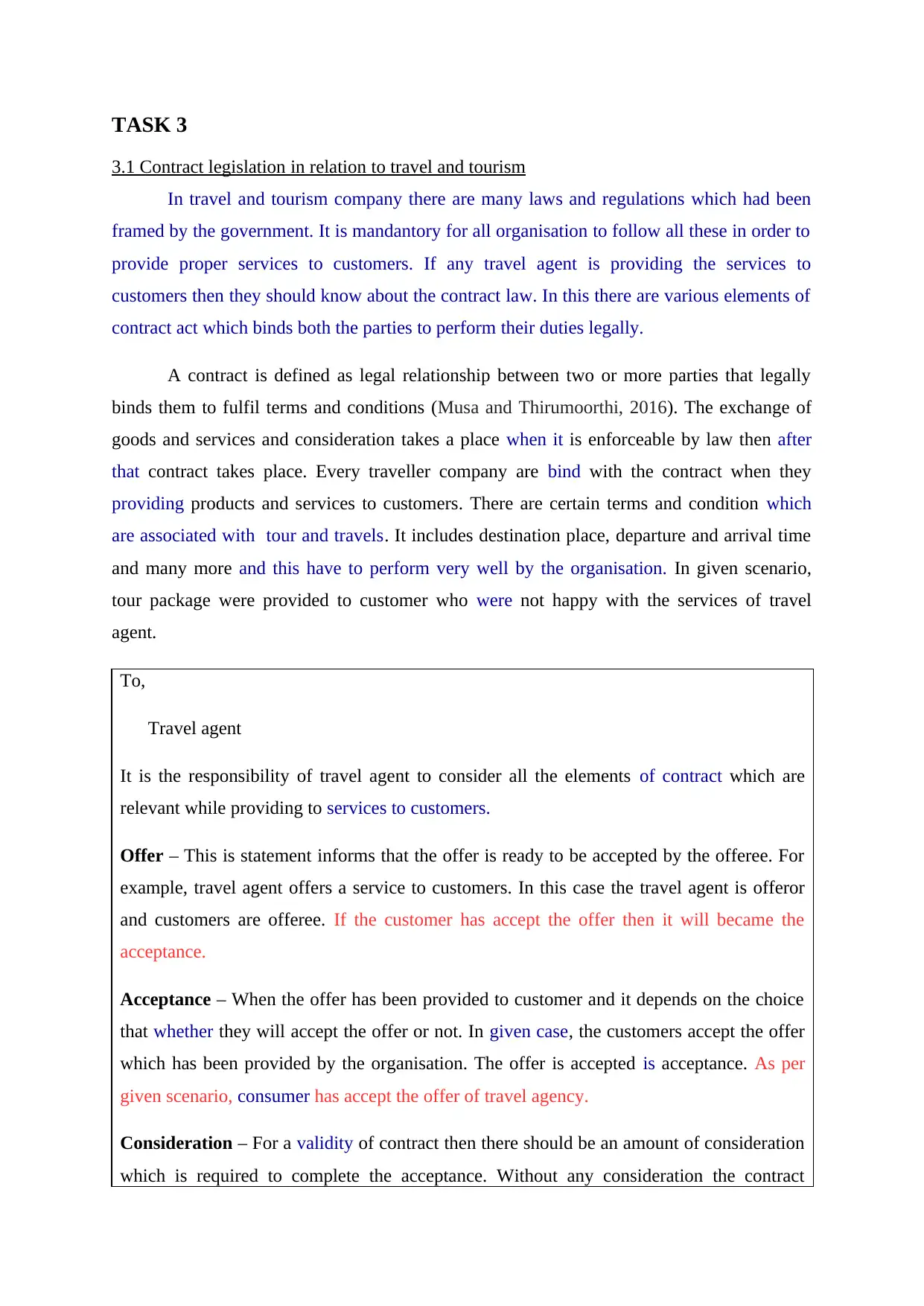
TASK 3
3.1 Contract legislation in relation to travel and tourism
In travel and tourism company there are many laws and regulations which had been
framed by the government. It is mandantory for all organisation to follow all these in order to
provide proper services to customers. If any travel agent is providing the services to
customers then they should know about the contract law. In this there are various elements of
contract act which binds both the parties to perform their duties legally.
A contract is defined as legal relationship between two or more parties that legally
binds them to fulfil terms and conditions (Musa and Thirumoorthi, 2016). The exchange of
goods and services and consideration takes a place when it is enforceable by law then after
that contract takes place. Every traveller company are bind with the contract when they
providing products and services to customers. There are certain terms and condition which
are associated with tour and travels. It includes destination place, departure and arrival time
and many more and this have to perform very well by the organisation. In given scenario,
tour package were provided to customer who were not happy with the services of travel
agent.
To,
Travel agent
It is the responsibility of travel agent to consider all the elements of contract which are
relevant while providing to services to customers.
Offer – This is statement informs that the offer is ready to be accepted by the offeree. For
example, travel agent offers a service to customers. In this case the travel agent is offeror
and customers are offeree. If the customer has accept the offer then it will became the
acceptance.
Acceptance – When the offer has been provided to customer and it depends on the choice
that whether they will accept the offer or not. In given case, the customers accept the offer
which has been provided by the organisation. The offer is accepted is acceptance. As per
given scenario, consumer has accept the offer of travel agency.
Consideration – For a validity of contract then there should be an amount of consideration
which is required to complete the acceptance. Without any consideration the contract
3.1 Contract legislation in relation to travel and tourism
In travel and tourism company there are many laws and regulations which had been
framed by the government. It is mandantory for all organisation to follow all these in order to
provide proper services to customers. If any travel agent is providing the services to
customers then they should know about the contract law. In this there are various elements of
contract act which binds both the parties to perform their duties legally.
A contract is defined as legal relationship between two or more parties that legally
binds them to fulfil terms and conditions (Musa and Thirumoorthi, 2016). The exchange of
goods and services and consideration takes a place when it is enforceable by law then after
that contract takes place. Every traveller company are bind with the contract when they
providing products and services to customers. There are certain terms and condition which
are associated with tour and travels. It includes destination place, departure and arrival time
and many more and this have to perform very well by the organisation. In given scenario,
tour package were provided to customer who were not happy with the services of travel
agent.
To,
Travel agent
It is the responsibility of travel agent to consider all the elements of contract which are
relevant while providing to services to customers.
Offer – This is statement informs that the offer is ready to be accepted by the offeree. For
example, travel agent offers a service to customers. In this case the travel agent is offeror
and customers are offeree. If the customer has accept the offer then it will became the
acceptance.
Acceptance – When the offer has been provided to customer and it depends on the choice
that whether they will accept the offer or not. In given case, the customers accept the offer
which has been provided by the organisation. The offer is accepted is acceptance. As per
given scenario, consumer has accept the offer of travel agency.
Consideration – For a validity of contract then there should be an amount of consideration
which is required to complete the acceptance. Without any consideration the contract
Paraphrase This Document
Need a fresh take? Get an instant paraphrase of this document with our AI Paraphraser
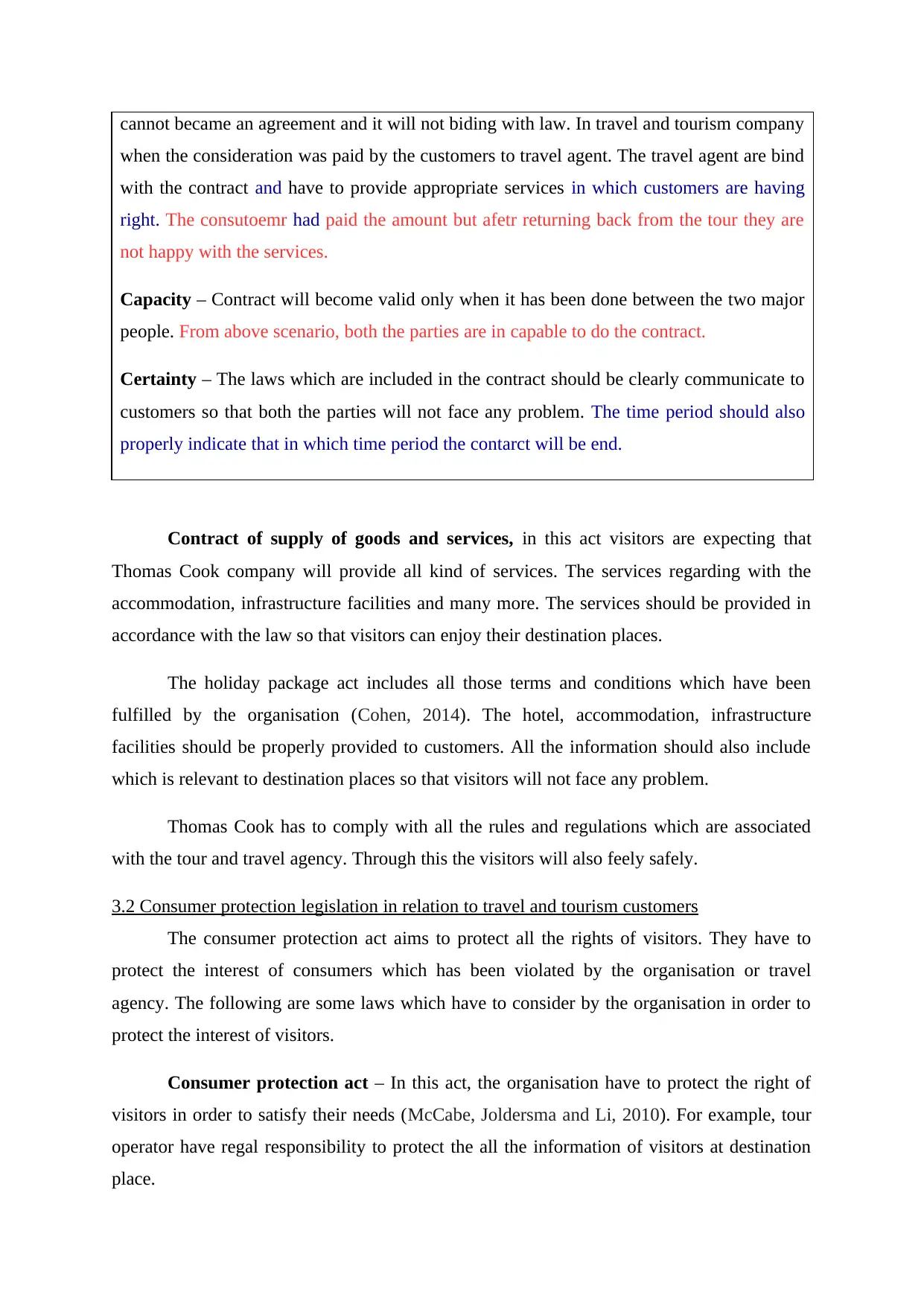
cannot became an agreement and it will not biding with law. In travel and tourism company
when the consideration was paid by the customers to travel agent. The travel agent are bind
with the contract and have to provide appropriate services in which customers are having
right. The consutoemr had paid the amount but afetr returning back from the tour they are
not happy with the services.
Capacity – Contract will become valid only when it has been done between the two major
people. From above scenario, both the parties are in capable to do the contract.
Certainty – The laws which are included in the contract should be clearly communicate to
customers so that both the parties will not face any problem. The time period should also
properly indicate that in which time period the contarct will be end.
Contract of supply of goods and services, in this act visitors are expecting that
Thomas Cook company will provide all kind of services. The services regarding with the
accommodation, infrastructure facilities and many more. The services should be provided in
accordance with the law so that visitors can enjoy their destination places.
The holiday package act includes all those terms and conditions which have been
fulfilled by the organisation (Cohen, 2014). The hotel, accommodation, infrastructure
facilities should be properly provided to customers. All the information should also include
which is relevant to destination places so that visitors will not face any problem.
Thomas Cook has to comply with all the rules and regulations which are associated
with the tour and travel agency. Through this the visitors will also feely safely.
3.2 Consumer protection legislation in relation to travel and tourism customers
The consumer protection act aims to protect all the rights of visitors. They have to
protect the interest of consumers which has been violated by the organisation or travel
agency. The following are some laws which have to consider by the organisation in order to
protect the interest of visitors.
Consumer protection act – In this act, the organisation have to protect the right of
visitors in order to satisfy their needs (McCabe, Joldersma and Li, 2010). For example, tour
operator have regal responsibility to protect the all the information of visitors at destination
place.
when the consideration was paid by the customers to travel agent. The travel agent are bind
with the contract and have to provide appropriate services in which customers are having
right. The consutoemr had paid the amount but afetr returning back from the tour they are
not happy with the services.
Capacity – Contract will become valid only when it has been done between the two major
people. From above scenario, both the parties are in capable to do the contract.
Certainty – The laws which are included in the contract should be clearly communicate to
customers so that both the parties will not face any problem. The time period should also
properly indicate that in which time period the contarct will be end.
Contract of supply of goods and services, in this act visitors are expecting that
Thomas Cook company will provide all kind of services. The services regarding with the
accommodation, infrastructure facilities and many more. The services should be provided in
accordance with the law so that visitors can enjoy their destination places.
The holiday package act includes all those terms and conditions which have been
fulfilled by the organisation (Cohen, 2014). The hotel, accommodation, infrastructure
facilities should be properly provided to customers. All the information should also include
which is relevant to destination places so that visitors will not face any problem.
Thomas Cook has to comply with all the rules and regulations which are associated
with the tour and travel agency. Through this the visitors will also feely safely.
3.2 Consumer protection legislation in relation to travel and tourism customers
The consumer protection act aims to protect all the rights of visitors. They have to
protect the interest of consumers which has been violated by the organisation or travel
agency. The following are some laws which have to consider by the organisation in order to
protect the interest of visitors.
Consumer protection act – In this act, the organisation have to protect the right of
visitors in order to satisfy their needs (McCabe, Joldersma and Li, 2010). For example, tour
operator have regal responsibility to protect the all the information of visitors at destination
place.
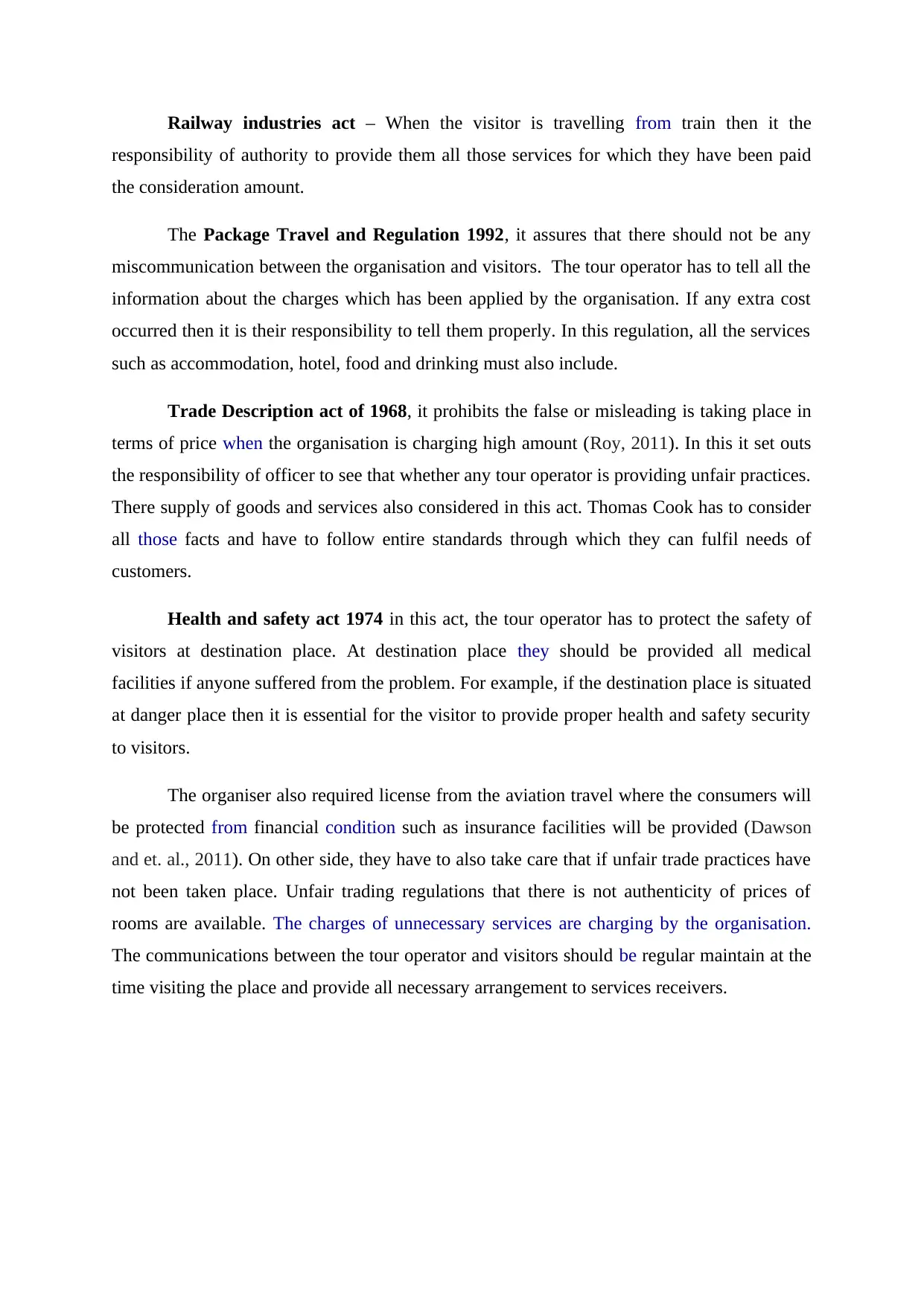
Railway industries act – When the visitor is travelling from train then it the
responsibility of authority to provide them all those services for which they have been paid
the consideration amount.
The Package Travel and Regulation 1992, it assures that there should not be any
miscommunication between the organisation and visitors. The tour operator has to tell all the
information about the charges which has been applied by the organisation. If any extra cost
occurred then it is their responsibility to tell them properly. In this regulation, all the services
such as accommodation, hotel, food and drinking must also include.
Trade Description act of 1968, it prohibits the false or misleading is taking place in
terms of price when the organisation is charging high amount (Roy, 2011). In this it set outs
the responsibility of officer to see that whether any tour operator is providing unfair practices.
There supply of goods and services also considered in this act. Thomas Cook has to consider
all those facts and have to follow entire standards through which they can fulfil needs of
customers.
Health and safety act 1974 in this act, the tour operator has to protect the safety of
visitors at destination place. At destination place they should be provided all medical
facilities if anyone suffered from the problem. For example, if the destination place is situated
at danger place then it is essential for the visitor to provide proper health and safety security
to visitors.
The organiser also required license from the aviation travel where the consumers will
be protected from financial condition such as insurance facilities will be provided (Dawson
and et. al., 2011). On other side, they have to also take care that if unfair trade practices have
not been taken place. Unfair trading regulations that there is not authenticity of prices of
rooms are available. The charges of unnecessary services are charging by the organisation.
The communications between the tour operator and visitors should be regular maintain at the
time visiting the place and provide all necessary arrangement to services receivers.
responsibility of authority to provide them all those services for which they have been paid
the consideration amount.
The Package Travel and Regulation 1992, it assures that there should not be any
miscommunication between the organisation and visitors. The tour operator has to tell all the
information about the charges which has been applied by the organisation. If any extra cost
occurred then it is their responsibility to tell them properly. In this regulation, all the services
such as accommodation, hotel, food and drinking must also include.
Trade Description act of 1968, it prohibits the false or misleading is taking place in
terms of price when the organisation is charging high amount (Roy, 2011). In this it set outs
the responsibility of officer to see that whether any tour operator is providing unfair practices.
There supply of goods and services also considered in this act. Thomas Cook has to consider
all those facts and have to follow entire standards through which they can fulfil needs of
customers.
Health and safety act 1974 in this act, the tour operator has to protect the safety of
visitors at destination place. At destination place they should be provided all medical
facilities if anyone suffered from the problem. For example, if the destination place is situated
at danger place then it is essential for the visitor to provide proper health and safety security
to visitors.
The organiser also required license from the aviation travel where the consumers will
be protected from financial condition such as insurance facilities will be provided (Dawson
and et. al., 2011). On other side, they have to also take care that if unfair trade practices have
not been taken place. Unfair trading regulations that there is not authenticity of prices of
rooms are available. The charges of unnecessary services are charging by the organisation.
The communications between the tour operator and visitors should be regular maintain at the
time visiting the place and provide all necessary arrangement to services receivers.
⊘ This is a preview!⊘
Do you want full access?
Subscribe today to unlock all pages.

Trusted by 1+ million students worldwide
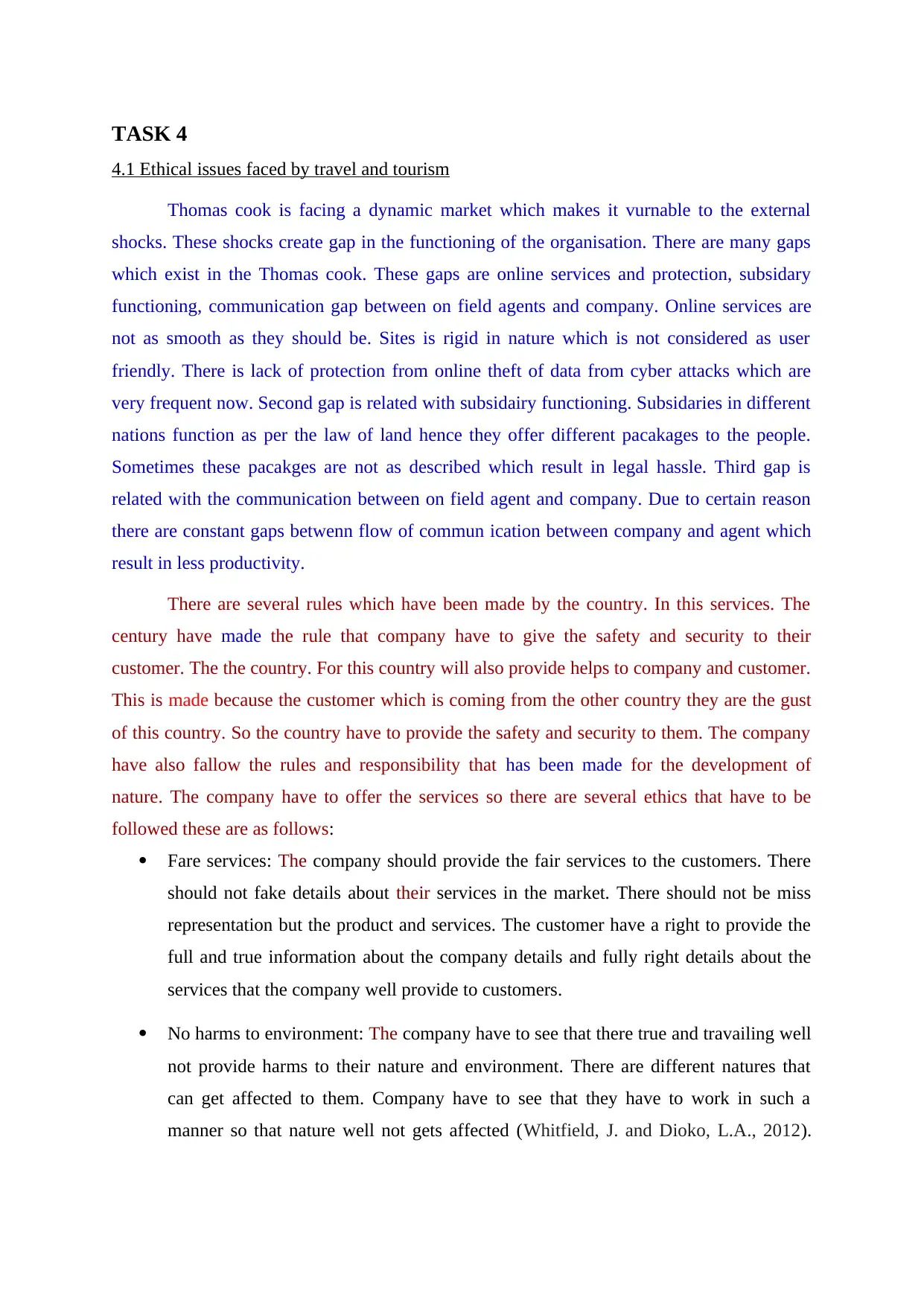
TASK 4
4.1 Ethical issues faced by travel and tourism
Thomas cook is facing a dynamic market which makes it vurnable to the external
shocks. These shocks create gap in the functioning of the organisation. There are many gaps
which exist in the Thomas cook. These gaps are online services and protection, subsidary
functioning, communication gap between on field agents and company. Online services are
not as smooth as they should be. Sites is rigid in nature which is not considered as user
friendly. There is lack of protection from online theft of data from cyber attacks which are
very frequent now. Second gap is related with subsidairy functioning. Subsidaries in different
nations function as per the law of land hence they offer different pacakages to the people.
Sometimes these pacakges are not as described which result in legal hassle. Third gap is
related with the communication between on field agent and company. Due to certain reason
there are constant gaps betwenn flow of commun ication between company and agent which
result in less productivity.
There are several rules which have been made by the country. In this services. The
century have made the rule that company have to give the safety and security to their
customer. The the country. For this country will also provide helps to company and customer.
This is made because the customer which is coming from the other country they are the gust
of this country. So the country have to provide the safety and security to them. The company
have also fallow the rules and responsibility that has been made for the development of
nature. The company have to offer the services so there are several ethics that have to be
followed these are as follows:
Fare services: The company should provide the fair services to the customers. There
should not fake details about their services in the market. There should not be miss
representation but the product and services. The customer have a right to provide the
full and true information about the company details and fully right details about the
services that the company well provide to customers.
No harms to environment: The company have to see that there true and travailing well
not provide harms to their nature and environment. There are different natures that
can get affected to them. Company have to see that they have to work in such a
manner so that nature well not gets affected (Whitfield, J. and Dioko, L.A., 2012).
4.1 Ethical issues faced by travel and tourism
Thomas cook is facing a dynamic market which makes it vurnable to the external
shocks. These shocks create gap in the functioning of the organisation. There are many gaps
which exist in the Thomas cook. These gaps are online services and protection, subsidary
functioning, communication gap between on field agents and company. Online services are
not as smooth as they should be. Sites is rigid in nature which is not considered as user
friendly. There is lack of protection from online theft of data from cyber attacks which are
very frequent now. Second gap is related with subsidairy functioning. Subsidaries in different
nations function as per the law of land hence they offer different pacakages to the people.
Sometimes these pacakges are not as described which result in legal hassle. Third gap is
related with the communication between on field agent and company. Due to certain reason
there are constant gaps betwenn flow of commun ication between company and agent which
result in less productivity.
There are several rules which have been made by the country. In this services. The
century have made the rule that company have to give the safety and security to their
customer. The the country. For this country will also provide helps to company and customer.
This is made because the customer which is coming from the other country they are the gust
of this country. So the country have to provide the safety and security to them. The company
have also fallow the rules and responsibility that has been made for the development of
nature. The company have to offer the services so there are several ethics that have to be
followed these are as follows:
Fare services: The company should provide the fair services to the customers. There
should not fake details about their services in the market. There should not be miss
representation but the product and services. The customer have a right to provide the
full and true information about the company details and fully right details about the
services that the company well provide to customers.
No harms to environment: The company have to see that there true and travailing well
not provide harms to their nature and environment. There are different natures that
can get affected to them. Company have to see that they have to work in such a
manner so that nature well not gets affected (Whitfield, J. and Dioko, L.A., 2012).
Paraphrase This Document
Need a fresh take? Get an instant paraphrase of this document with our AI Paraphraser
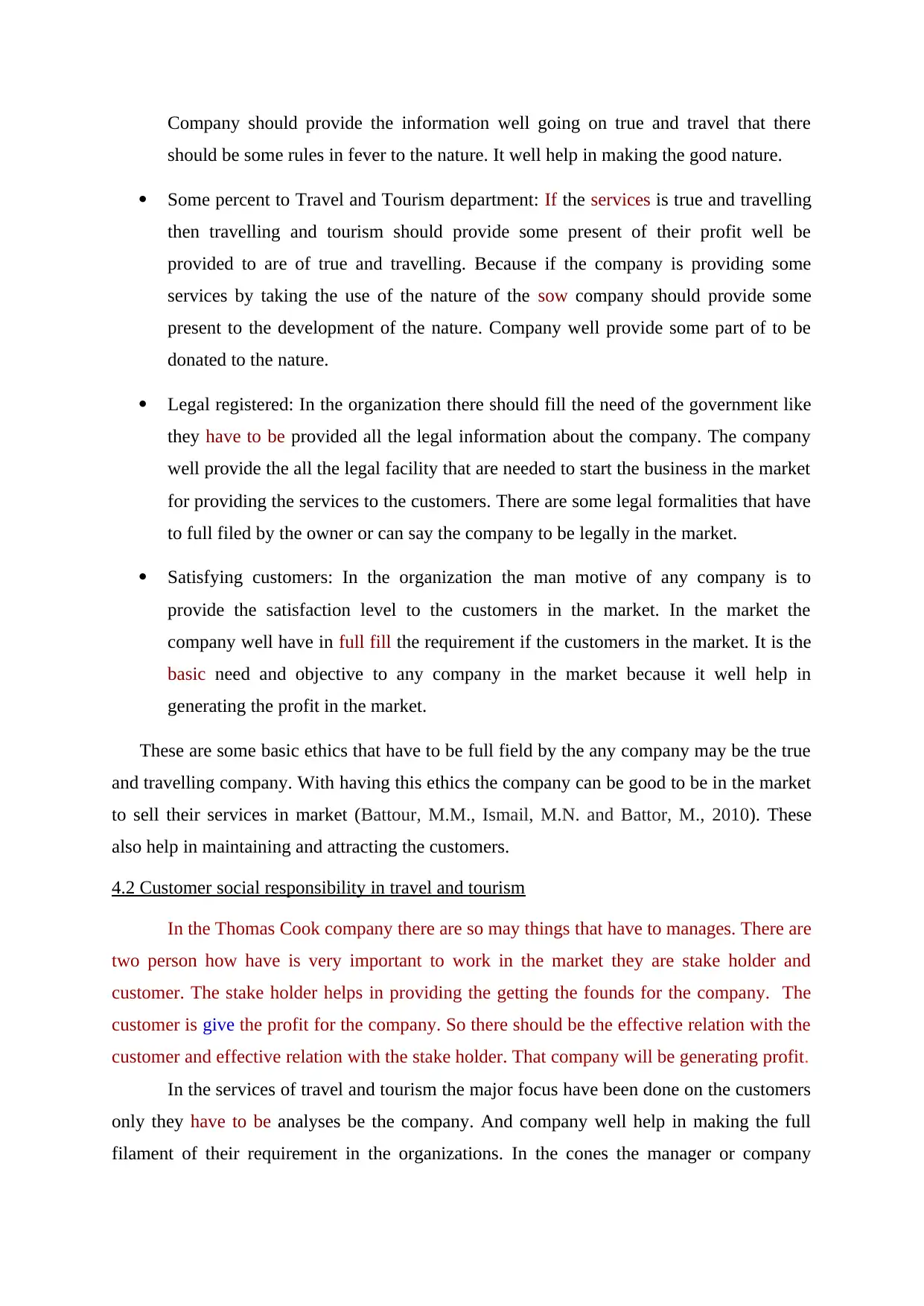
Company should provide the information well going on true and travel that there
should be some rules in fever to the nature. It well help in making the good nature.
Some percent to Travel and Tourism department: If the services is true and travelling
then travelling and tourism should provide some present of their profit well be
provided to are of true and travelling. Because if the company is providing some
services by taking the use of the nature of the sow company should provide some
present to the development of the nature. Company well provide some part of to be
donated to the nature.
Legal registered: In the organization there should fill the need of the government like
they have to be provided all the legal information about the company. The company
well provide the all the legal facility that are needed to start the business in the market
for providing the services to the customers. There are some legal formalities that have
to full filed by the owner or can say the company to be legally in the market.
Satisfying customers: In the organization the man motive of any company is to
provide the satisfaction level to the customers in the market. In the market the
company well have in full fill the requirement if the customers in the market. It is the
basic need and objective to any company in the market because it well help in
generating the profit in the market.
These are some basic ethics that have to be full field by the any company may be the true
and travelling company. With having this ethics the company can be good to be in the market
to sell their services in market (Battour, M.M., Ismail, M.N. and Battor, M., 2010). These
also help in maintaining and attracting the customers.
4.2 Customer social responsibility in travel and tourism
In the Thomas Cook company there are so may things that have to manages. There are
two person how have is very important to work in the market they are stake holder and
customer. The stake holder helps in providing the getting the founds for the company. The
customer is give the profit for the company. So there should be the effective relation with the
customer and effective relation with the stake holder. That company will be generating profit.
In the services of travel and tourism the major focus have been done on the customers
only they have to be analyses be the company. And company well help in making the full
filament of their requirement in the organizations. In the cones the manager or company
should be some rules in fever to the nature. It well help in making the good nature.
Some percent to Travel and Tourism department: If the services is true and travelling
then travelling and tourism should provide some present of their profit well be
provided to are of true and travelling. Because if the company is providing some
services by taking the use of the nature of the sow company should provide some
present to the development of the nature. Company well provide some part of to be
donated to the nature.
Legal registered: In the organization there should fill the need of the government like
they have to be provided all the legal information about the company. The company
well provide the all the legal facility that are needed to start the business in the market
for providing the services to the customers. There are some legal formalities that have
to full filed by the owner or can say the company to be legally in the market.
Satisfying customers: In the organization the man motive of any company is to
provide the satisfaction level to the customers in the market. In the market the
company well have in full fill the requirement if the customers in the market. It is the
basic need and objective to any company in the market because it well help in
generating the profit in the market.
These are some basic ethics that have to be full field by the any company may be the true
and travelling company. With having this ethics the company can be good to be in the market
to sell their services in market (Battour, M.M., Ismail, M.N. and Battor, M., 2010). These
also help in maintaining and attracting the customers.
4.2 Customer social responsibility in travel and tourism
In the Thomas Cook company there are so may things that have to manages. There are
two person how have is very important to work in the market they are stake holder and
customer. The stake holder helps in providing the getting the founds for the company. The
customer is give the profit for the company. So there should be the effective relation with the
customer and effective relation with the stake holder. That company will be generating profit.
In the services of travel and tourism the major focus have been done on the customers
only they have to be analyses be the company. And company well help in making the full
filament of their requirement in the organizations. In the cones the manager or company
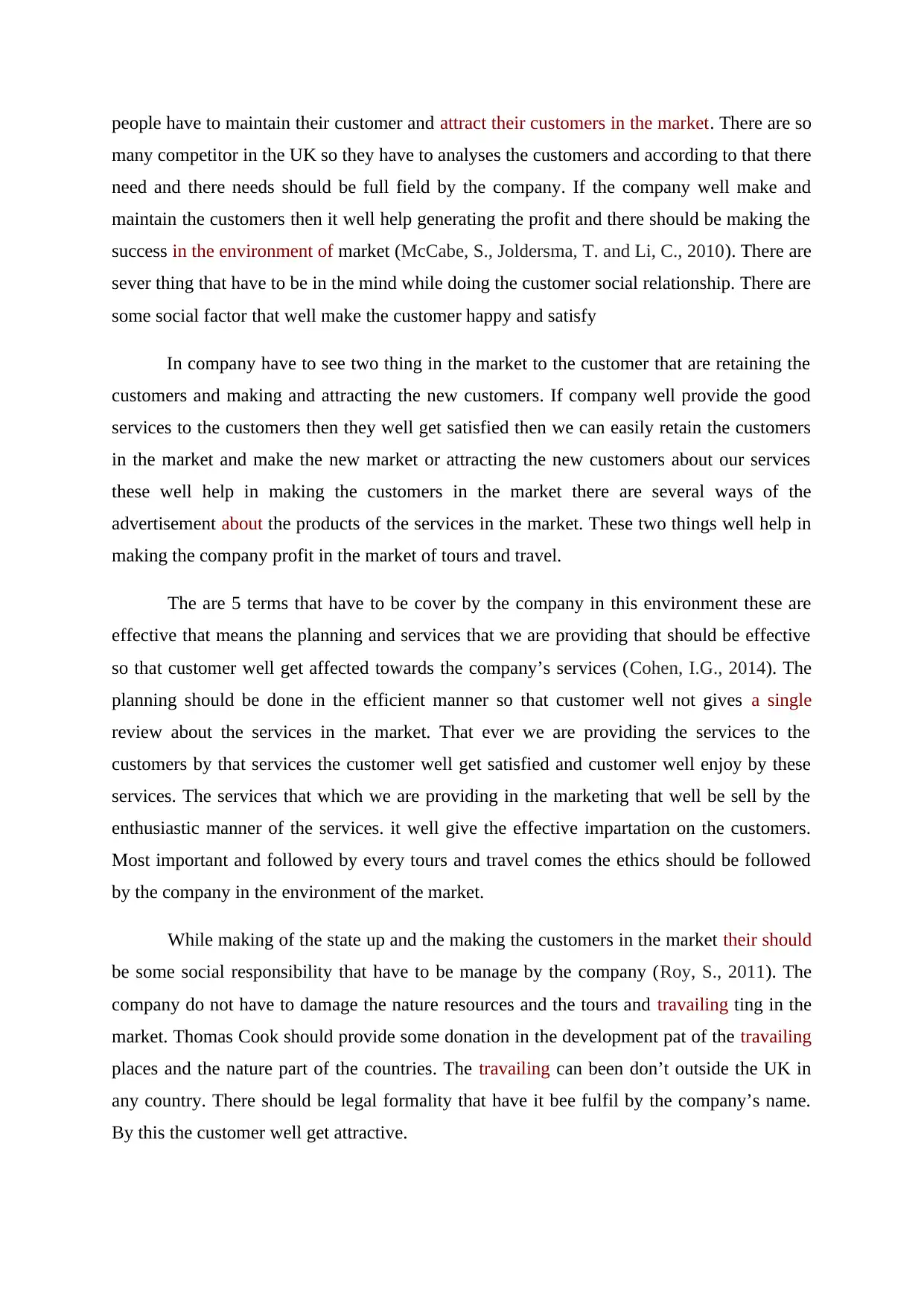
people have to maintain their customer and attract their customers in the market. There are so
many competitor in the UK so they have to analyses the customers and according to that there
need and there needs should be full field by the company. If the company well make and
maintain the customers then it well help generating the profit and there should be making the
success in the environment of market (McCabe, S., Joldersma, T. and Li, C., 2010). There are
sever thing that have to be in the mind while doing the customer social relationship. There are
some social factor that well make the customer happy and satisfy
In company have to see two thing in the market to the customer that are retaining the
customers and making and attracting the new customers. If company well provide the good
services to the customers then they well get satisfied then we can easily retain the customers
in the market and make the new market or attracting the new customers about our services
these well help in making the customers in the market there are several ways of the
advertisement about the products of the services in the market. These two things well help in
making the company profit in the market of tours and travel.
The are 5 terms that have to be cover by the company in this environment these are
effective that means the planning and services that we are providing that should be effective
so that customer well get affected towards the company’s services (Cohen, I.G., 2014). The
planning should be done in the efficient manner so that customer well not gives a single
review about the services in the market. That ever we are providing the services to the
customers by that services the customer well get satisfied and customer well enjoy by these
services. The services that which we are providing in the marketing that well be sell by the
enthusiastic manner of the services. it well give the effective impartation on the customers.
Most important and followed by every tours and travel comes the ethics should be followed
by the company in the environment of the market.
While making of the state up and the making the customers in the market their should
be some social responsibility that have to be manage by the company (Roy, S., 2011). The
company do not have to damage the nature resources and the tours and travailing ting in the
market. Thomas Cook should provide some donation in the development pat of the travailing
places and the nature part of the countries. The travailing can been don’t outside the UK in
any country. There should be legal formality that have it bee fulfil by the company’s name.
By this the customer well get attractive.
many competitor in the UK so they have to analyses the customers and according to that there
need and there needs should be full field by the company. If the company well make and
maintain the customers then it well help generating the profit and there should be making the
success in the environment of market (McCabe, S., Joldersma, T. and Li, C., 2010). There are
sever thing that have to be in the mind while doing the customer social relationship. There are
some social factor that well make the customer happy and satisfy
In company have to see two thing in the market to the customer that are retaining the
customers and making and attracting the new customers. If company well provide the good
services to the customers then they well get satisfied then we can easily retain the customers
in the market and make the new market or attracting the new customers about our services
these well help in making the customers in the market there are several ways of the
advertisement about the products of the services in the market. These two things well help in
making the company profit in the market of tours and travel.
The are 5 terms that have to be cover by the company in this environment these are
effective that means the planning and services that we are providing that should be effective
so that customer well get affected towards the company’s services (Cohen, I.G., 2014). The
planning should be done in the efficient manner so that customer well not gives a single
review about the services in the market. That ever we are providing the services to the
customers by that services the customer well get satisfied and customer well enjoy by these
services. The services that which we are providing in the marketing that well be sell by the
enthusiastic manner of the services. it well give the effective impartation on the customers.
Most important and followed by every tours and travel comes the ethics should be followed
by the company in the environment of the market.
While making of the state up and the making the customers in the market their should
be some social responsibility that have to be manage by the company (Roy, S., 2011). The
company do not have to damage the nature resources and the tours and travailing ting in the
market. Thomas Cook should provide some donation in the development pat of the travailing
places and the nature part of the countries. The travailing can been don’t outside the UK in
any country. There should be legal formality that have it bee fulfil by the company’s name.
By this the customer well get attractive.
⊘ This is a preview!⊘
Do you want full access?
Subscribe today to unlock all pages.

Trusted by 1+ million students worldwide
1 out of 15
Related Documents
Your All-in-One AI-Powered Toolkit for Academic Success.
+13062052269
info@desklib.com
Available 24*7 on WhatsApp / Email
![[object Object]](/_next/static/media/star-bottom.7253800d.svg)
Unlock your academic potential
Copyright © 2020–2025 A2Z Services. All Rights Reserved. Developed and managed by ZUCOL.





